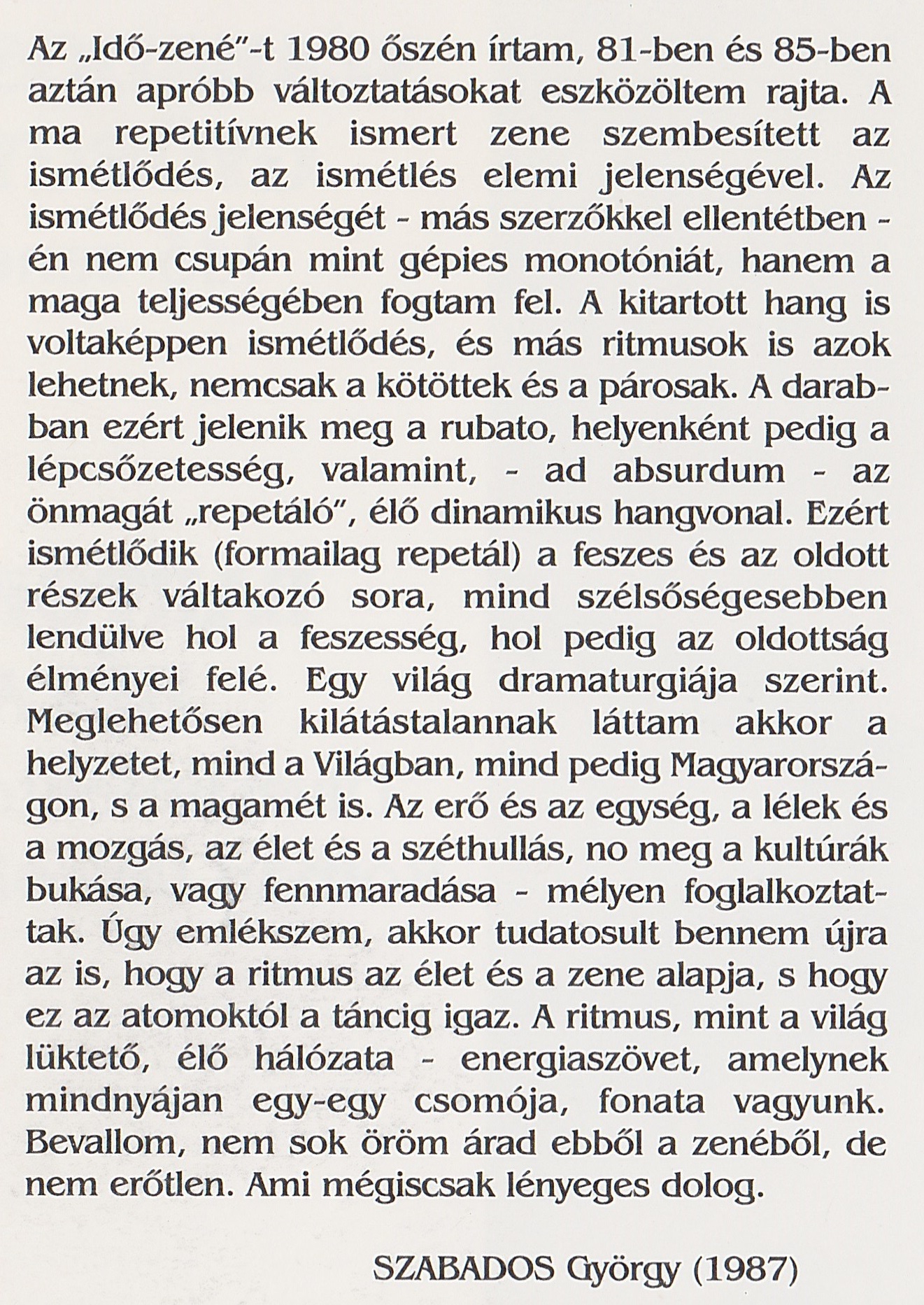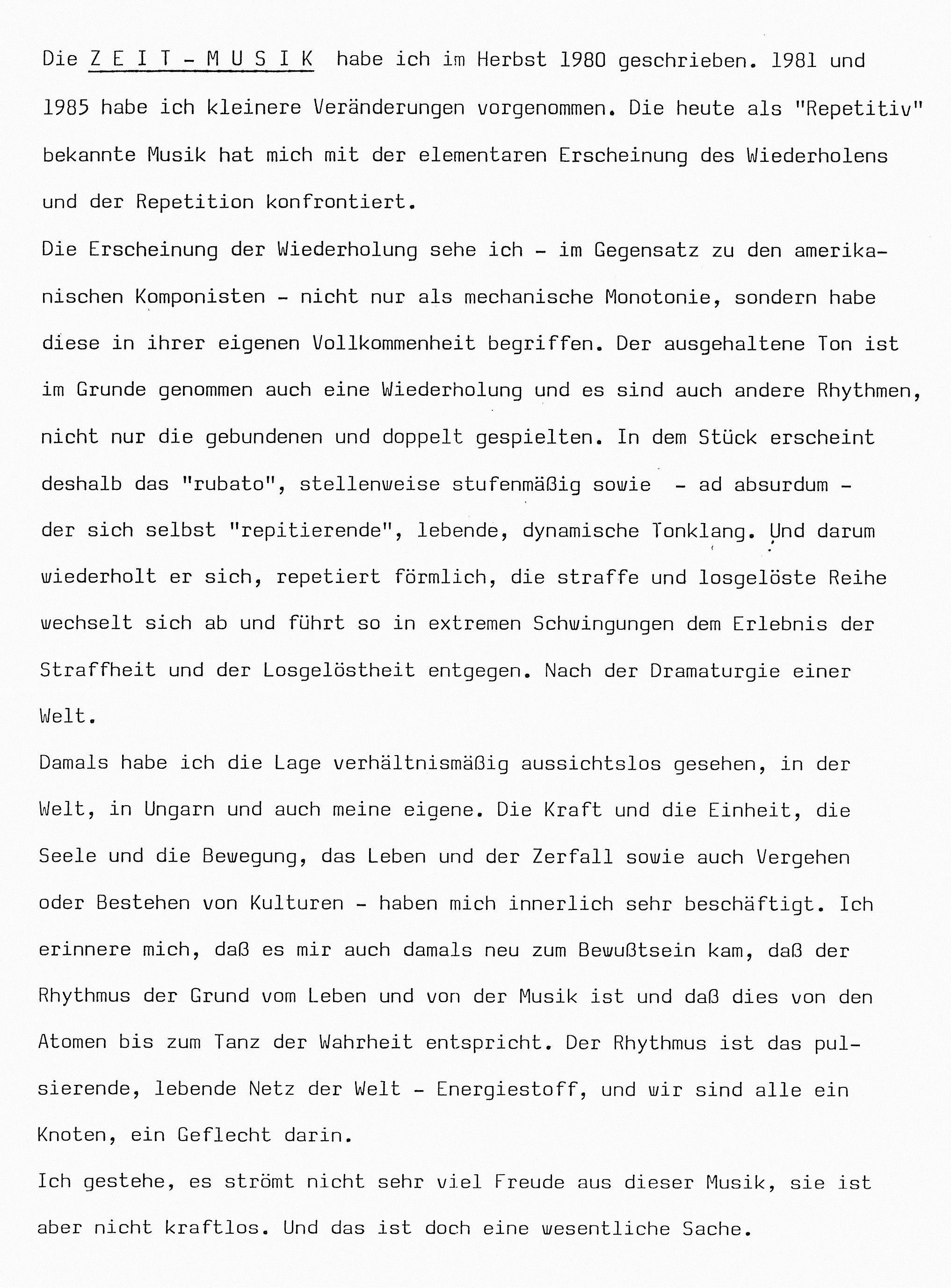Composition:
Musicians:
Official Releases:
LP / CD
Recording
Compositions
Musicians
Release Date: 1997 Recording Date: 7 – 13. June 1997 Recorded at: Studio of Fonó Music Hall, Budapest, Hungary
1) Idő-zene (Time-Music) 19:32
The Academy Soloists Chamber Orchestra Szabados György (musical director) Kovács Ferenc (concert master) Szabó Gábor (I. violin) Csonka Gábor (I. violin) Kovács Anikó (I. violin) Vince Zsuzsa (I. violin) Uhrin Viktor (I. violin) Zámbó Judit (II. violin) Zakar Katalin (II. violin) Túri Éva (II. violin) Nagymengyi Dóra (II. violin) Raincsák István (viola) Jávorka Jutas (viola) Polonyi István (viola) Oláh Miklós (cello) Nagy Ágnes (cello) Lantos Szilvia (cello) Buza Vilmos (double bass) Benkő Róbert (double bass) Patay Lóránt (double bass)
Release Date: 2011 Recording Date: 13. October 2011 Recorded at: Café Budapest Contemporary Art Festival, organized by the Italian Cultural Institute
Erno Dohnányi Symphony Orchestra Hollerung Gábor: conductor National Choir Chorus master: Mátyás Antal (# 2) Cecilia Lloyd (vocals -soprano) (# 2)
LINER NOTES: Time-Music (Idő-zene):
I wrote Time-Music in the fall of 1980, making some minor changes on it in 81 and 85.
The music known today as repetitive, confronted repetition, with repeating elementary figures. The occurance of repetition – as opposed to what others composers did – here is not merely a mechanic monotone, instead I approach it in its entirety. A continuous sound is, in actuality, repetition, other rhytms can exist beyond the fixed and double ones. That’s why the rubato appears in this piece, at times stair-like, as well as the live dynamic progression repeating itself – ad absurdum. And it repeats (in form) because the alternating line of tighter and looser parts, at times the tightness, other times, the looseness giving the most extreme momentum towards experience.
Like the drama of the world. At the time I felt that the situation was totally hopeless, in the world, in Hungary and my own as well. Strenght and unity, spirit and movement, life and collapse, the failure of the cultures, or survival – I was deeply involved in these questions. I remember realizing again that rythm is the foundation of life and music, and its true all the way from the atom to dance. Rythm like the world pulse, live network, the woven energy we are all tied into. I admit that there isn’t a lot of pleasure reaped from this music, but it isn’t without strength. Which, after all is important.
György Szabados (1987)

known live performances:
Performance Date
Location
Musicians
Recording
1986, 22 Mar.
1st performance of composition: “Time-Music (Idö-zene)” at Academy of Music, Budapest (HU) plus Composition “Periférikuz koncert” for Strings, Piano & Reeds
Szabados György (piano, leader) with Classical String Orchestra plus Members of MAKUZ Orchestra
Musicians:
Szabados György (conductor, prepared piano, piano)
Tréfás István (violin)
Györei Ildikó (violin)
Kovács Ferenc (violin, trumpet)
Horváth Péter (cello)
Benkő Róbert (double bass)
Lőrinszky Attila (double bass)
Kiss Gábor (double bass)
Dresch Mihály (soprano saxophone)
Grencsó István (alto saxophone)
Mákó Miklós (trumpet)
Baló István (drums, percussion)
Geröly Tamás (drums, percussion)
plus 6 unknown musicians
1989, 21 Mar.
performance of composition: “Time-Music (Idö-zene)” at Pesti Vigadó, Budapest (HU)
Szabados György (leader) with Classical String Orchestra plus Members of MAKUZ Orchestra
Musicians:
Szabados György (conductor)
other Musicians unknown
2011, 13 Oct.
performance of composition: “Time-Music (Idö-zene)” at the Café Budapest Contemporary Art Festival, organized by the Italian Cultural Institute, Budapest (HU)
Erno Dohnányi Symphony Orchestra, conducted by Hollerung Gábor.
